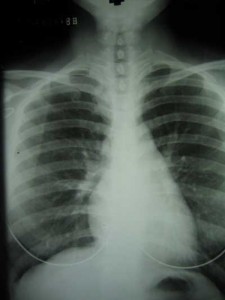Mesothelioma Lawyer
Nationwide Mesothelioma Lawyer
 The mesothelium is the tissue that lines your vital organs–the heart, stomach, lungs, among others. Mesothelioma is a tumor of the mesothelium. The tumor can be benign or malignant. Mesothelioma usually begins in the lungs, but can start in other areas of the body, as well–the abdomen, for instance.
The mesothelium is the tissue that lines your vital organs–the heart, stomach, lungs, among others. Mesothelioma is a tumor of the mesothelium. The tumor can be benign or malignant. Mesothelioma usually begins in the lungs, but can start in other areas of the body, as well–the abdomen, for instance.
What Causes Mesothelioma?
Most people who develop mesothelioma worked with, or were exposed to, asbestos particles. Asbestos is a natural mineral that is heat and chemical resistant. It is mined and has been used in various industries, including the construction and automotive industries. During the manufacturing process, tiny asbestos fibers are released into the air. They are then breathed in or swallowed. The fibers settle in the lung or in the stomach, and this eventually results in health problems down the road for many people. In general, it may take 30 to 40 years for mesothelioma to develop after exposure to asbestos.
It is important to note that, while it’s a primary cause, asbestos exposure is not the only cause. Others include:
-
Zeolites. These are a series of minerals that are related to asbestos. One such zeolite, erionite, is common in soil in some areas of Turkey, and is believed to be the reason for high occurrence of mesothelioma in those areas.
-
Radiation. There have been some published reports about the development of mesothelioma after exposure to high levels of radiation, particularly to the chest or abdomen.
-
The SV40 Virus. A few studies in lab animals have suggested that infection with the simian virus 40 may result in an increased risk of developing mesothelioma. To date, the largest of these studies has not found an increased risk, however, the science related to humans is continuing.
-
Genetics. There are those experts who believe that some people are genetically predisposed to contracting mesothelioma under the right conditions.
Who Gets Mesothelioma?
Work exposure to asbestos is linked to as many as 70 to 80 percent of mesothelioma cases. In addition, it may be that family members of those who worked with asbestos also have a greater risk of developing mesothelioma due to asbestos dust brought home on the clothing of the workers.
Mesothelioma Symptoms
The mesothelioma signs and symptoms vary, depending upon where, in the body, the cancer occurs. If the tissue that surrounds the lungs is affected (pleural mesothelioma), the symptoms are:
-
Chest pain under the rib cage.
-
Shortness of breath.
-
Painful coughing.
-
Unexplained weight loss.
-
Unusual lumps of tissue under the skin on the chest.
For a cancer of the tissue in the abdomen (peritoneal mesothelioma), signs and symptoms include:
-
Abdominal pain.
-
Lumps of tissue in the abdomen.
-
Abdominal swelling.
-
Unexplained weight loss.
Mesothelioma Treatment
Your doctor will perform a physical examination and may order a chest x-ray or CT-scan to check for abnormalities. Based on those results, further testing may be required including a biopsy. This will determine whether you have mesothelioma and if so, which type. After the type of cancer has been determined, it will next be determined at which Stage (I-IV) the cancer is. The type and stage of the mesothelioma, as well as your overall health, will determine the appropriate treatment plan. This could include surgery, chemotherapy, radiation therapy, and possible treatment through clinical trials.
Because there are so many treatment options, it’s best to discuss those options and treatment goals with your physician.

